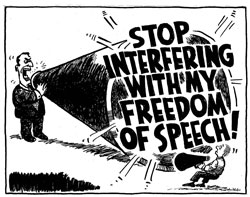McCutcheon vs. Federal Election Commission Case Debated
 Capitalism underpins the greatest freedoms in the United States. The goal of earning individual profits is inherent in a free society, with personal gain acting as a motivator in a fluid class structure. As it relates to the recent decision of McCutcheon v. Federal Election Committee, the Supreme Court opted to protect the capitalistic rights of the individual, voting against the campaign finance limits set forth by the Bipartisan Campaign Reform Act. The act, according to fec.gov, sought to limit campaign contributions made by individuals so as to fight corruption within the political sphere.
Capitalism underpins the greatest freedoms in the United States. The goal of earning individual profits is inherent in a free society, with personal gain acting as a motivator in a fluid class structure. As it relates to the recent decision of McCutcheon v. Federal Election Committee, the Supreme Court opted to protect the capitalistic rights of the individual, voting against the campaign finance limits set forth by the Bipartisan Campaign Reform Act. The act, according to fec.gov, sought to limit campaign contributions made by individuals so as to fight corruption within the political sphere.
However, as it was aptly reasoned by Chief Justice John Roberts, restrictions on an individual’s campaign contributions immediately strikes against First Amendment protections regarding the freedom of speech. In Roberts’ opinion, he elaborated that as it pertains to political speech, “The First Amendment safeguards an individual’s right to participate in the public debate through political expression and public association. When an individual contributes money to a candidate, he exercises both of those rights.”
By striking down campaign contribution limits, the Supreme Court is making the political world more accessible to the average person. Expressing one’s political views requires an audience willing to listen. And despite the advent of the internet and social media, a captive audience is difficult to come by, considering the availability of conflicting ideas and opinions. Thus, in line with the United States’ representative democracy, political campaign contributions are the best opportunity for those dedicated to political expression to convey their ideas by supporting the candidates who represent them.
Additionally, by reforming individual expenditure limits, the Supreme Court is actually increasing political transparency. The mythical Super PACs (Political Action Committees) according to “Real Clear Politics,” are collectives which can amass grandiose amounts of donations from individuals, corporations or seemingly any other donors, and were originally conceived to subvert contribution limits, requiring that they do not operate in conjunction with any candidate. However, as long as Super PACs disclosed their donors, they are generally unrestricted with how to spend the funds. Thus by, eliminating the individual campaign contributions limits, the Supreme Court ruling in McCutcheon v. FEC effectively ensures that those who wish to politically express themselves through donations can guarantee their contributions are reaching the candidates they support.

